#child rearing is a social work and labor people do even if it is their own choice
Text
Me to myself, soothingly: Youtube wants you to rage engage and that's why it put it in your recommended... Youtube wants you to rage engage and that's why it put it in your recommended... Youtube wants you to rage engage and that's why it put it in your recommended...
#this is about a childfree channel video about how childfree people are being quote unquote discriminated in the workplace#look LOOK#Don't have children whatever#but I hate this idea that children are some sort of hobby people have#for which they should shoulder all social costs#because like the video was complaining about how people with children are more likely to be conceded off time when they ask for it#and similar concessions vis a vis childfree people#and like no Karen I'm sorry your theater rehearsal is objectively not as urgent as a parent having a sick child to take care of#child rearing is a social work and labor people do even if it is their own choice#and I'm tired of people pretending it's not
16 notes
·
View notes
Text
Rant: Labour By Paris Paloma
This might get me hate, but I’m not sure. So, I was listening to Labour by Paris Paloma and it just honestly rubbed me the wrong way. I think it’s because the video that shows a woman who is clearly upper-middle class in a historical setting where she would of most likely have had a few servants and even some slaves to take care of everything shown in the video is complaining. It feels disingenuous to me because all I can think is that the servants below stairs should be saying this to both of them. Like I said I doubt she or he gets the water or fixes the gables. Even if she wasn’t married she would still have to do menial labor. Life ain’t free. Also, why not leave and if possible get a divorce? I get that’s what she's planning on doing, but why not sooner. Also, if they possibly already have a son, is she going to leave him behind with the husband who appears to be a drunkard as well as an abusive bastard?
I also think there is important context missing for the man because there is a huge difference between say working as a farmer/farm-hand or a gentleman farmer vs working in a trade like mining or millinery. I can definitely understand a guy coming home from something like that bone-deep tired and not wanting to do anything. Made worse if he came back from war and has trauma. A lot of men in England could not vote historically as well as women because they didn’t own enough or any land. Voting rights were dependent on land holdings. A day laborer could no more vote than his wife.
Most women were more focused on surviving and living to care about how they were treated. We honestly have to understand that they would really not have known any different. Homemaking was the norm and to deviate meant you were a spinster and thus a burden on your relatives. A single woman would have to rely on the charity of family and friends, if they did not marry and have their own household. Marriage provided women with freedom and security they wouldn’t have otherwise. They could of course work as a maid, farm-hand, or tutor/governess, but those would not have necessarily paid well. I don’t even want to know why this needs to be said, but it does none the less. Women did not work alone to do all these things regardless of having servants. Women would work together to complete tasks like cooking and looming, which could and would bring in income as well. Child rearing was a community thing. Grandparents, Aunties, Uncles, and older siblings would help look after the younger ones. Just look at William the conquerer and his wife Matilda, who had nine children.
The video would make more sense if set in the post-war years of the late ‘40s/early ‘50s where the white picket fence dream was more of a thing and where your stereotypical housewife would be found since this type of wife is in fact a recent phenomenon because most couples would both bring in an income either through a dowry or funds made in the above mentioned ways. However, war rationing was still happening during these years in Britain. It lasted fourteen years in total. Also, the dream is an American one, so it’s kinda weird a Brit would want it. Marriage was not about love historically. It was more of a contract between families for economic and social status reasons. Often neither party got a say in it. It makes me wonder why the woman/women are not blaming their parents instead. In fact, England made it hard for people under 21 to just elope, so they would run away to Gretna Green. If this woman did run away with this man because she thought he would save her and so she could seemingly just kickup her feet and do nothing but instead he treats her like Cinderella, well that’s somewhat her fault. It kind of reminds me of my sister who has a man-child for a boyfriend who doesn’t do shit but yet begs her for money and makes her do everything, but it’s still her fault she’s in that relationship, but not that she gets treated like that.
Why does it seem that people forget effective contraceptives are very recent things? So yes, a woman having sex historically would most likely get pregnant. A man pulling out is only about 80% effective. Condoms did exist but they didn’t really work well.
I honestly don’t get why people are using this song for famous women who were badasses or cruel like Katherine of Aragon or Queen Bloody Mary Tudor. No one cares about lesser known badass women like Yolande of Aragon, who acted as regent of Provence during the minority of her son. She played a crucial role in the struggles between France and England as well. She helped fund Jeanne D’Arc {Joan of Arc}. Some of these women over shadowed their husbands like Catherine de’ Medici, wife of Henry II of France. I’m sorry this was so fucking long, but I had to get this out. Cross posting on Minds.com.
9 notes
·
View notes
Text
Burn All Copies of “To Train Up A Child”
I once had a man I was babysitting for pull my pants down and hit my nude bottom with a PVC pipe when I refused to beat his child with one. I was probably 9 or 10. He read me sections of that book to justify himself afterward. I kept it to myself because so many people in my church followed that book that I was embarrassed for having “gotten in trouble” and wanted to keep the job (which I lost because I refused to use a PVC pipe to beat a toddler as advised in that book).
I had a Sunday school teacher for 2 years who would hit our hands with a ruler if we couldn’t perfectly recite the memory work (I escaped him by dropping out of Sunday School to volunteer in the nursery and as a sub in younger classes and then eventually to serve as an assistant administrator because my mom for once stood up to the church after I developed blisters from being beaten in the same spot every week). I was called manipulative and over-indulged when my mother put and end to the physical abuse during the 2nd year. When I shaved my head and started dressing like a boy and rumors of me dating girls got around I was brought to a meeting with all the church elders where they berated me about the horrible immorality of homosexuality and my mother’s refusal to use violence as a punishment was seen as the root of my “falling into a dark path”.
I had a crying breakdown one Easter while singing because Jesus died for me and I couldn’t even be a good girl for him and every body around me clapped and gathered around and encouraged me to “weep for my sins” like my distress was this beautiful holy thing.
ive mentioned before but as teenagers mind control tactics like malnutrition and sleep deprovision were practiced on us and presented as “staying up late eating junk food, with some prayer” nobody I knew came out of that place normal.
In the nursery if a child cried i risked both myself and the child being beaten and it causes me to over-coddle the babies I work with and not let them self sooth because a crying child makes me panic. I considered my church family.
Apparently there is a new pastor there and he is very progressive and has actually expressed to my mom that he wants to meet me along with members of my generation to apologize for the abuse allowed to go on at that church during our childhood but i feel weird about it. I also feel like its just physical abuse. There was no sexual abuse by clergy, just first generation German immigrant strictness and old world child rearing tactic and a toxic book that is responsible for pretty much all the religious trauma that wasn’t homophobia-related. My grandpa got his knuckles hit 5 days a week and turned out fine so maybe im just a sissy snowflake but thank god I at least had the nursery as a refuge because my learning disability was treated like a moral failing on a religious level deserving of physical violence and because I was so good in the nursery instead of doing my last unit of Sunday School I took charge of the nursery and I still wonder what happened to some of those kids but Im not sure if an apology from somebody who wasn’t even involved is what I want but I did a lot of work for that church (Enough volunteer hours to graduate as a senior girl scout, the female equivalent of an Eagel scout) and did thousands of hours of unpaid labor for them in my life. I don’t know if it would be healing just to be acknowledged and told what was done to me wasn’t god’s work but I also don’t want to risk anger coming up and coming out at a man who has done nothing wrong and just wants to right the past.
My best friend was in an arranged marriage at 16 to the grandson of the abusive teacher so her family could get in with the church elders and they are on like their 4th kid. My mom finally stopped working for them for 1/4 the asking salary for her position so Im at least glad that she got away from them financially even if she is still involved socially and Id like to believe her claims that drastic progressive changes were made. Im debating attending a service just for her this sunday but Im also wary that even being back in that building might be triggering.
But even though there were so many bad memories, there are so many good ones, so many more good ones of it being the only place I really had friends as a pre-teen. I feel like when most people talk about traumatic childhoods they consistently say it as bad. But in my case it was rose-tinted other than a few “weird” (thats the world I like to use, I know its minimizing but id rather not be dramatic) incidents. And the crazy thing is the people responsible for those incidents especially within the church probably didnt know they were being abusive, they probably think they were “stern” to save our souls. I had moments in that church where I truly felt god’s love. But ive also had wrath enacted upon me in his name.
But yeah TLDR if u purchase a copy of “to train up a child” the state should take ur kids that book is pure evil I don’t think any book should be illegal but “To Train Up A Child” really tests the fortitude of that belief because I want every copy of it destroyed.
5 notes
·
View notes
Text
mothers of large families (especially in poor communities) were probably some of the most capable and intelligent people in history and no I'm not even kidding a little bit
I won't pretend like there haven't been more educated people or more skilled and talented people, but in terms of like, groups of people who were consistently capable and should have/were respected and had authority, being a matriarch of a large family (especially if the family was largely still living considering how frequent infant and child mortality was) was quite a feat to achieve
you have to be able to manage a household, so any and all domestic affairs (cleaning, cooking, child rearing, finance, like all social engagement planning and the actual social performance), insane amounts of emotional labor, plus!! play doctor, play carpenter, play field worker, play basket weaver (which is another piece of domestic labor that would probably be sold for money so it's not like they weren't already!!! providing as a worker!!), and basically "play" professions that they weren't allowed to hold because of lack of means and their gender
if you're poor and you have one kid and they get sick, it's going to be hard but you can usually scrape together enough funds/donations to go to the doctor for your one kid who's sick (obviously dependant on the situation, this is a generic hypothetical).
if you have six, seven kids, hell even more! historically families would have like 12, 15 kids to make sure enough lived and were able to work, especially farmers. if you have that many kids, and one of them is sick, you don't go to a doctor, you start taking care of what you can at home. you don't get medicine, you use home remedies and leftovers from previous prescriptions. obviously im not saying like, it's a good idea to forgoe medical treatment or to share medications/save old medications (especially not anti biotics lol), but in the past, when you're poor, you would need to have a much keener sense of illness, of injury, of disease, in order to gauge if you NEED medical treatment bc largely it isn't something you can just go get
and this applies to any profession that they were capable of performing (didn't require apprenticeship or formal education/training to do nonprofessionally), bc you end up learning to do what you can't afford to buy. i bet your parents cut your own hair till you were a certain age. a lot of parents never stop!
this is all to say, I was texting my mom today ab a condition I had just found out I have, and she was able to name it by me just describing it, bc one of my siblings had it when they were little. she said "not officially diagnosed, me diagnosed" and I remembered the millions of times that I had brought up symptoms and she had a clue ab what it was, all the times she had a book for just the right task/craft/research topic. I remember her climbing on ladders and fixing things, painting, laboring in a way that most would consider "men's work" or tradesman work. There is so much that my mom has done because she needed to, for her or for her kids, and so much of that has been forgotten or taken for granted as I've needed less constant support to survive.
Obviously fathers, and poor fathers especially, have had to do and still do similar things. being poor is not a gendered phenomenon. but when culturally you are tied to an entire domestic sphere, when you aren't traditionally (or legally!) allowed to work or become educated, there is a unique aspect to that perspective that includes the expected societal role of women that I find very interesting, and sincerely overlooked
#not to mention birth being a whole thing even WITHOUT risk of dying every time#women built this world and men helped but fr they should be recognized respected and acknowledged for their labors#mothers are so important too#mothers are soooo important#and yet they are often an afterthought or taken as a given#much to say much to consider#if women were taught to write and poor women especially we would probably have such great works and histories#books of all trades and generational knowledge#obvi we have that to some degree but like#throughout history and consistently#okay im done#women#history#trash.txt#mothers#mothers in history#women in history
1 note
·
View note
Text
Blog Post Assignment #2
Family is very important in Belgium. Members of the immediate family share pretty much every meal together. Both immediate members and relatives are often very close to each other, as well – though contact with neighbors isn’t as close (even in smaller villages), because people tend to value privacy. Parents typically support their kids financially until they reach adulthood. While both parents work, women are usually responsible for doing chores around the house, as well as taking care of the kids. In general, families in Belgium have up to three kids. Many kids enjoy playing sports, going to concerts and cinemas, and scouting on weekends.
While women hold many of the child rearing responsibilities, there are also plenty of other options – especially for parents with busier schedules. For example, all Belgian parents can use public childcare that is subsidized by the government. Public daycare is very popular, and people are usually put on a waiting list. It is recommended that parents register with several daycare centers after their pregnancy is confirmed. Belgium also has other childcare options for kids aging from a few months to two years. These include preschools, nurseries, au pairs, and childcare provided by your employer.
There is also an emphasis on older people being active in the community. In Belgium, people think that people should continue to participate in social, economic, cultural, spiritual, and civic activities instead of just being physically active or participating in the labor market. This is especially important when it comes to healthy ageing. Older people are encouraged to become more active in their communities because of the potential benefits of participation for health and overall wellbeing.
Globalization and migration impact family structure in many ways. In Belgium specifically, migration has many effects on the country. Compared to other countries in the European Union, Belgium does not perform very well regarding immigrants’ integration into the workforce. Discrimination is still a prominent issue coming into the country from other places, despite the legal framework.
Access to education is also strongly and positively correlated to immigrants’ integration into the workforce. Children of immigrants tend to do much better in terms of employment, but they do not have equal access to higher education as Belgian natives. Belgium has a low rate of equity when it comes to origins of the education system. In fact, it has one of the lowest levels of all OECD countries.
Other major factors that play into the integration of immigrants into the workforce include acquisition of Belgian citizenship, proficiency in one of the national languages, and ethnic discrimination. Recognition of qualifications can also have an impact on it.
1 note
·
View note
Text
Hymenaios
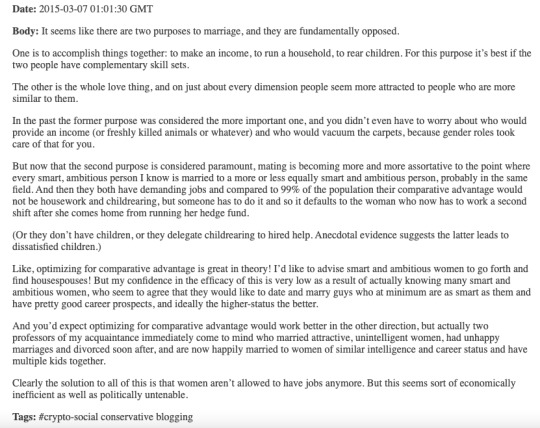
Dear Caroline:
This was a rather perspicacious reflection about marriage. Then again, I would not expect less from your bright little mind.
The traditional marriage is indeed receding everywhere, and I ignore if it is in any way possible to prop it up. In my own background, it was rather common in our parent's generation for the majority of mothers to be homemakers, and divorce had only recently been made legal, and was practically unseen -and heavily stigmatized- in our rural community. The converse is the truth now: it is extremely difficult to find a stay-at-home mother or father, and our divorce rates are among the highest in the world, making marriage for most people a pretty dangerous gamble.
I don't want to sound elegiac and old-fashioned, and 'traditional' marriage had many negative aspects, but I am not sure I am completely onboard with our modern take. Beyond the unequal distribution of tasks that you have mentioned, I can think of at least two other issues: one would be the commodification of relationships, in which romantic partners are treated as temporary expedients and treated much as we do with consumer goods, as something with an expiry date and to be enjoyed until we find something better in the menu. Related to this would be the second problem: a general reluctance and/or incapacity to engage in 'adult', 'mature' and 'stable' relationships for life. As you said, marriage traditionally created a new and (at least in theory) permanent affective-socio-economic unit of which child-rearing was one of the most important aspects. I am quite convinced that our current practices are a main contributor to the disastrous birth rates in the West.
I imagine some remedies could be proposed, short of your tongue-in-cheek enforced female joblessness. Perhaps as a society, we could economically dignify the homemaker in a married couple (with half of the salary and social welfare benefits being automatically transferred to him/her?), but I don't think it would work. The main issue here would be that in the lack of commitment and trust, it is irrational to seriously hinder one's economic independence. Maybe with future increases in productivity and automation and less total requirement of human labor, even full-time workers will have more time to spend with their families. But right now, I feel we are stuck in a quandary.
Quote:
A perfect marriage is just two imperfect people who refuse to give up on each other.
0 notes
Text
How strong is the extreme feminist war effort? British women's white feather movement, so many men to die of shame and anger
Since entering the new era, the slogan of gender equality has been shouted for many years, but in some aspects there are still inequalities between men and women, in these inequalities, not only some men do not put women in a reciprocal position to see, and even some women do not put themselves in the right position, so on the network there are such groups of women as field feminism.
When it comes to field feminism, I believe many people have a certain understanding of this type of women often put gender equality on the lips, but also want men to take full responsibility, they do not do anything to get the maximum benefit, this self-interested feminism let people disagree.
On the Internet, we can often see some idyllic feminist fighters who indiscriminately attack men without even understanding what is going on, and under the banner of feminism, they let men die socially.
However, these feminist fighters can also be on the Internet to show off their power and be a keyboard warrior, but in fact, the killing power of men is not so strong.
But in Britain there is a group of fighting feminists, they launched a white feather campaign, have taken to the streets, with a white feather to let countless men die of shame, what is it?
After the Industrial Revolution, a large number of factories sprang up on British soil, which caused fierce competition, and the capitalists, in order to expand the scale and increase productivity, began to use a large number of women workers and child laborers.
Because the physical strength of women and child laborers than male workers, so the capitalists lowered their wages, increase the number of hours of work, so that the output will come up, so the employment of female workers than male workers more cost-effective, and even use female workers to crowd out male workers, so as to reduce their wages.
At first, these women workers were very energetic to work, but after a long time, the overload and low wages caused dissatisfaction among women workers, so in the first half of the nineteenth century, women workers in England began a variety of strike movements, demanding the capitalists to give them a wage increase and improve their working conditions.
In parallel with the strike movement, women felt that their social status had to be upgraded, so a large number of women formed many organizations to fight for political participation, such as the Feminist League, the Women's Suffrage League, and the Women's Social and Political League.
Under the male-dominated social system, the women's suffrage movement made a lot of noise and did not have any good effect in substance, but with the outbreak of the First World War, British women finally had a chance to turn over a new leaf.
At that time, more than thirty countries around the world participated in the war, including Britain, because a large number of young and strong men went to the front line to fight, which led to a void in domestic productivity, and in order to make production work properly, various factories used a large number of female workers, which increased women's social participation and also reflected the importance of women.
Although women workers became the main force when it came to work, feminists were not satisfied with this. What they wanted most was to improve their political status so that they could later have a voice in society and get more benefits for women.
Just when feminist organizations were worried about this, an opportunity to improve their political status came, and it was actually related to the war.
In order to win the war, Britain has been able to mobilize the front line to fight the mobilization of people, but with the war situation, there is still a need for a large number of soldiers to go to the front, but some young people are not willing to go to war, so the British Royal Army General Charles Fitzgerald came up with a somewhat unethical method to stimulate the youth in the rear to go to war.
This method was called "humiliating provocation", and Admiral Charles encouraged the public to humiliate those healthy youths in public, and to give those youths a white feather, which symbolized the meaning of coward. Organized by women's rights leaders, women took white feathers and walked the streets and alleys to humiliate men, which became the famous White Feather Movement in England.
Since the start of the white feather movement, it did have a certain effect, in order to avoid being humiliated by these women again, many people quit their jobs and signed up to join the army to fight on the front line, and some people were unbearably humiliated, but for various reasons and could not go to join the army, so they finally committed suicide in shame.
In fact, at a later stage, these feminists became so radical that they didn't even know whether the target of the humiliation was physically fit or not, and whether they met the conditions to join the army, so they humiliated people.
Some retired veterans, they also want to humiliate people, so that caused many people to commit suicide in shame, such feminism is really too much, and deviated from the right track, and became a tool for revenge against men.
1 note
·
View note
Text
Six Weeks Into an Era
A sequel to Three Weeks Into an Era. Someone ages ago asked for a sequel. Blame them 👀💅🏾.
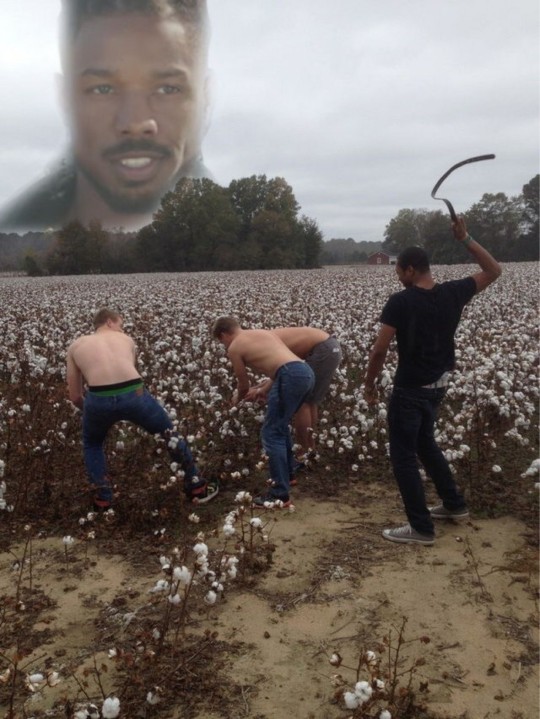
The plantation hidden deep into private land was an instant success and as reporters broadcasted nationally on the mass disappearance of white men over the age of 21 with an unfamiliar air of fear and a new sense of panic, no connection could be made between the disappearances and the new booming businesses due to the preexisting condition that is outsourcing factory labor. Erik and his crew were fat cats rolling in dough. Dante had been promoted to head of the all-male plantation as Erik floated from camp to camp, the latest camp being for women. It was 10 miles away from the first camp and nicknamed Camp Karen by the all-female team of overseers that supervised the property.
"PICK UP YOUR MACHETE AND SWING YOUR GOD DAMN ARM, BRIDGETTE," Kathy seethed turning bright pink under her frosty white bobbed hair. She'd been toiling in the high heat for three hours, the sun beating on her causing sweat to drip all down her chiffon blouse. She was soaked and pissed.
"You better listen to her, Bridgette," Shavon chuckled misting herself with her battery operated spray fan. "I'll keep y'all out here all day and night until all that sugarcane is harvested. You won't eat or sleep."
Bridgette was a twenty-four year old engaged yoga instructor and mother of one 2-yr-old according to her profile provided by Erik. Her favorite pastimes included yelling at people of color who she perceived to be immigrants and throwing around the N word at black service workers. She'd even gotten violent on numerous occasions. Now she was screaming to the top of her lungs in a sugarcane field, refusing to work despite the fact that she was holding up twelve other exhausted and angry white Karens who were all but frothing at the mouth . She picked up the machete and swung it wildly.
"I don't care if you hit them lice lizards you rode in with, bitch, but if you swing it this way I'll assume you're swinging at me and you WILL be taken down," Shavon eyed the sandy blonde and lanky woman ensuring she understood. As Bridgette began to cry and wail, the other women fussed amongst themselves, fed up and exhausted from the hold up of Bridgette not doing her part. "Oh do you not like her behavior??" They had a nerve. They were all at the plantation for similar offenses. Some for way worse.
Thirty minutes of tantrum rolled by and Shavon returned to the air conditioned tent for a cool drink of Gatorade while Alexis took over as the active overseer. Alexis wasted no words having watched the entire meltdown from afar in her chair. She pulled her whip and lashed Bridgette on the back to snap her into quick action.
"This is what your people did to my people, remember?! You bring it up all the time to black people when you're getting your nonfat lattes you must remember but in case you don't, let me remind you." With another snap of the whip across Bridgette's back, Bridgette started working in double-time. She needed to catch up on all the chopping she had not done. "PUT YOUR BACK INTO IT," Alexis yelled. "YEAH I CAN SCREAM TOO."
Alexis had originally been gentle, but truckloads of entitled and extremely racist white women had ruined that side of her. She stung Bridgette once more holding nothing back, the pain of her ancestors her driving force in that moment. "Do you know that it's estimated that 40% of slaveowners were white women? Yeah? We were currency for you.. A way for you to escape your sorry ass lot as a lesser counterpart to your white man and gain some type of freedom since you couldn't freely acquire land. You say it's the past yet you still view us as your step stool. Well not here, bitch. Pick up the pace."
Meanwhile, at the all-male camp, Overseer Dante kept his group of caucasians in line by threat of fire. He introduced what he called the gun line. If any of the men were to take so much as a step past the boundary of the plantation he'd be dropped on sight. "TRY IT MILK MUTANT. YOUR TOE WILL BE THE ONLY THING LEFT OF YOU," he yelled to a younger pale face with trouble in his eyes. He had yet to be broken, but it was a matter of time.
Erik was out with the truck on the hunt, ready to abduct new cattle based on a list of addresses and coordinates. The world had all but come to a stop, discussing the disappearances to the point that it was the main topic on all news stations and had been for a while. Pictures of socially high ranking white men were displayed from MSNBC to FOX. The president had declared a state of emergency. It was disgusting for Erik to witness considering the ratio of missing white men compared to black men. There had never been so much as a televised conference or lasting discussion regarding the disappearance of non-white people. Erik felt even more justified in his actions. Erik's team also felt just as justified.
"WHY CAN'T WE JUST GO HOME," Bridgette collapsed into the soil, shaking and crying, her portion of the harvest not near complete. "I just wanna go to take care of my SON!" Snot dripped down her top lip mixed with dirt, tears, and sweat.
"You think I give a damn about your little snotty nosed brat? When MY people, my literal great-grandmother was ripped away from her own child? Couldn't breastfeed her own child because she had to breastfeed a white woman's child? Cook and clean in a white woman's home to survive? You think I give a fuck about you? My great-grandmother was whipped by a white woman for being raped by the white husband. She went blinding one eye because of it. The same white women she cooked and cleaned for and raised her child. You think I'm supposed to give a damn about yours? Get the hell up," her top lip disappeared over her teeth as she reared the whip in a real threat once more. Bridgette scrambled to her feet, still sobbing as Alexis walked away back to the tent to collect herself.
"You okay?" Shavon had listened to the whole thing, sipping cold Gatorade in the cool air.
"I'm irritated, I just need to watch some Family Feud to get my mind off of it," she muttered dropping down to watch the small television.
"Girl don't let it get to you, you let that whip get to them ranch roaches and release that stress."
"I know, girl.. I know.." She propped her feet up with a cold beer in hand and Shavon returned to the field refreshed with a new idea in mind.
"Since SOME of you moon crickets don't wanna work there's gonna be some changes around here. Going forward, the last one to finish gets 10 lashes and a night sleeping in the hole. Hopefully that lights a fire under your meth addicted pink and red flat asses. We know who's sleeping in the hole tonight!"
Bridgette's angry shriek was at its loudest yet.
"That's for you Lexi," Shavon called to the tent with a proud grin. Alexis waved in grateful solidarity just as the familiar drop off truck rolled in.
"ERIK," Alexis exclaimed jumping up and fixing her hair to jog to the truck. It was him and he was tired and brooding as usual. "Hey, we've been keeping them busy on our side. Are you gonna stay?"
"Girl, let him out the truck," Shavon smirked from the side, prompting Alexis to stop blocking his door. She was overly excited as always and as always, Erik was uninterested.
"New shipment," he spoke to Shavon giving her the details on eight new women who could be heard screaming as soon as Erik lifted the sound proof gate. "Your problem now," he patted her shoulder with humor in his weary eyes. "Have fun."
#original#erik killmonger#killmonger#erik stevens#erik killmonger fanfiction#erik stevens au#black panther killmonger#black panther fanfiction#six weeks into an era
39 notes
·
View notes
Text
Something I've been thinking about recently as a larger sociological trend is that as a greater percentage of women in the US have entered the workforce (~30% in the 1940s, steadily rising until it peaked ~60% in the early 2000s, rn it's about 57%; source, U.S. Bureau of Labor Statistics), that means working people and especially working families have less free time overall.
Like this is a very white/heteronormative basis I'm thinking of, largely informed by the demographics of people I work with in my union; but assuming a nuclear family with a man working ~40 hours a week and a woman staying at home to do the unpaid work of raising kids, cooking, and cleaning, that means the total paid working hours of a family were 40, with a whole person to do the home stuff (and sometimes even with help doing that, if they hired someone — most likely a woman of color — to do or help with those tasks). That leaves free time for both people in question. Now, if you have two working parents working full time, or even one full time and one part time, they both have less time to do the work of cooking, cleaning, and child-rearing at home. Having one person be able to earn an income that allows for another parent to stay at home is a privilege afforded to far fewer families than was the case decades ago, when labor in the US had more power from unions, more domestic manufacturing, etc.
I think this has to have drastic implications for working people's physical health, their stress levels and their mental health, their sleep habits, their ability to be social beings who spend time with friends and community around them, affecting their ability to get involved in community organizing, to be an active citizen or an activist who is able to expend the time/effort to stay informed and engage in their local politics or in labor organizing... the list is neverending.
I was looking at the Bureau of Labor Statistics and they have lots of data that breaks this down by gender, race, age, whether the person in question has children and how old those children are, full-time work vs part-time work, etc. Obviously there have always been some women who worked outside the home, especially women of color, unmarried/single women, women in poor families. Those people and families have always had less time for both domestic work and for leisure.
But I think the big picture remains the same, that as women have drastically increased their labor force participation, which is a *good thing* that allows women to be more independent and live without being financially dependent on men, there is a total sum of free time that the working class has lost. And this ties in to an argument that I've seen a lot of people make, that the 40-hour workweek is tied to a standard that no longer exists and is too long, but idk how many people I've seen explicitly tie this to the ability to engage in labor organizing work.
I was thinking about it this week when the instructors at my union hall were talking to me and the other 1st-year apprentices about how we need to get involved because a lot of the guys involved in local labor clubs and stuff right now are getting older. And I was thinking. Are/were these older guys married? Did they have kids? Did their wives (my union is dominated by straight white men, there's like three queer women counting myself who are all apprentices, there are zero out gay men) work or stay at home? How are/were their households organized? What were their average work hours when they were employed? (So many young guys in my apprentice class *love* overtime. They want to work a ton of it, especially now, I think; they might want to work less as they get older/have kids, idk.)
Tl;dr I think we need a shorter workweek for a multitude of reasons, but a big one for me is to get more young folks engaged in organizing. But I don't know how many guys I could get to be interested in fighting for that, and I think even if I could, which is not at all guaranteed, we'd face a strong uphill battle against contractors who benefit from long working hours in construction in order to meet aggressive fast-paced deadlines.
#anyway as you can expect i am watching other workers' fight for a shorter workweek very closely 👁#whether they be office workers here or workers in other countries#labor#organizing#public health#capitalism#unions
8 notes
·
View notes
Text
Slime and Punishment - deviantart
Vik’Tor, being an alien and all that, found himself learning new things about Earth every day. Like how it was fine for men to go topless in public but not for women, or that it was inappropriate to talk about your sexual exploits with strangers. Strange. Luckily, due to his meek personality, he managed not to embarrass himself too much.
More to the point, there were so many things from his culture that he took for granted, but humans had no knowledge of! He was the only Torran on Earth, at least as far as he knew: the rest of his tribe generally turned out to be warmongering morons, and they only took interest in visiting planets when they wanted to conquer them. Things were peaceful here, and he’d found a cozy little town that accepted him.
Now he was working odd jobs, mainly to figure out what he wanted to do with the rest of his life. He was only 29 moon-strides old, after all...he had plenty of time to discover his passions. Today’s job was filling in for a rich family’s gardener. Apparently the man had been struck by a car and flattened like a pancake, and someone needed to take over while the doctors were reinflating him. Vik didn’t mind the work: in fact he quite fancied a good day of honest labor. But, come lunch time, he was positively famished.
He tucked into a double-decker mustard and eggplant sandwich and swiftly downed a concoction of his own creation, lemonade and Bloody Mary mix. Others found his tastes revolting, but he loved finding new flavor combinations. The real star of the show, however, was dessert…
“Pardon me, but what is that you’re eating,” came a soft feminine voice from behind him. “I simply must know, it smells so wonderful!” Vik turned around, locking eyes with a slender young woman with caramel-colored skin. Or perhaps it was a particularly short man. He wasn’t sure which, nor did he know if it even mattered.
“Ah, this?” Vik remembered just in time not to talk with his mouth full, and promptly swallowed. “We call it korrupa, it is a traditional dessert amongst the Ulvions.” He held it up: a shimmering orb of green that seemed to have a life of its own.
“Oh, so that’s what your tribe is called? Fascinating.”
“Well,” said Vik awkwardly. “Not exactly. My people conquered their planet and slaughtered all of their men.”
“Oh.”
Even with his obvious lack of social skills, Vik could tell the conversation was grinding to a painful halt. “Well, the good news is that it is quite easy to get korrupa delivered. Did you know that this town has one of Earth’s only transdimensional portals?”
The short one shrugged. “I’m not surprised. I’ve lived here all my life and I learn something new about this place.” He fidgeted, looking plaintively at the glossy green glob that Vik was devouring. “Do you mind letting me have a sample of your korrupa? I’ll take just a tiny bit, but my chef’s curiosity is just eating me alive! I must have some!”
Vik paused. “Well, Missus, or Mister, or whatever Earth honorific suits you best, I don’t know if you would be suited to trying some...it is quite filling, and you are quite small.”
This earned a little titter from the short one. “I’ll be able to handle it, I assure you. Oh pardon my manners! I haven’t even introduced myself. Camille, no Earth honorifics necessary.” Camille offered one hand out to shake, the other to take.
“I am called Vik’Tor...but you really must consider! It could be ill-suited to your digestive tract! Or perhaps there would be some other unforeseen consequences…!”
Camille stuck his tongue out cutely, reaching out and grabbing the korrupa. Vik realized then how tiny the Earth creature was in comparison to him; his hands were like a child’s in comparison to Vik’s own, hefting up the wobbly substance and bringing it to his tiny little mouth.
The young man moaned softly, his slender lips wrapping around the korrupa and slurping it up eagerly. Within seconds the shimmering green mass—about the size of an Earth coconut—had disappeared down Camille’s gullet. “Oh! Pardon me,” he said sheepishly. “I didn’t mean to eat it all...but it was like it had a mind of its own! Hehe. It was remarkable, though! Absolutely delicious.”
Vik looked noticeably crestfallen at the loss of his dessert but didn’t bring it up. However, something that Camille had said sparked a realization inside him. “Oh, you did not know? Korrupa is a sentient creature, it would be quite accurate to say that it does indeed have a mind of its own. Were you not aware of this?”
Camille’s cheeks went noticeably green at this. “Oh dear. Did I just devour an alien without knowing?”
“Fear not,” said Vik, waving his hands quickly. “They are not harmed by this. In fact, they often reproduce inside warm, damp enclosed spaces. Us Torrans have rather dry insides, so we are not affected much. But I do not know about Earth creatures...”
Said Earth creature went even greener. “Oh dear...oh dear indeed.” His cheeks bulged slightly, as if about to gag. “I might have made a rather costly mistake…” But now Vik saw a truly bizarre sight: Camille’s face starting to glow. Not from the skin directly, but almost beneath it somehow. Most prominent were his cheeks—a bright lime green—which had really begun to puff up now. His lips, starting to run out of room on his face, began squashing into an askew O shape, the tiny opening revealing a growing colony of korrupa inside his mouth.
His belly began harboring the telltale green glimmer of his cheeks, the boy’s shirt quickly becoming near-translucent as the slime found a larger reservoir to reside in. Camille’s midriff, previously so thin as almost to be famished, started to bloat rapidly. Although not quite resembling pregnancy, his stomach was now so round and fertile as to immediately invite the comparison.
Camille gave a throttled moan, the korrupa inside his mouth jiggling as words tried in vain to escape. He gave Vik a desperate look, his hands unsure whether to cradle his burgeoning belly or try and unload the cargo inside his mouth. After a slight hesitation, they chose the latter. But as his fingers tried to pry apart his lips, a thick strand of the sentient goo snaked out and slapped away his hands.
“Korrupa do not like the breeding process to be interrupted,” said Vik weakly. “Although they do have a vested interest in keeping their host alive, so you will not have to worry about bursting or suffocating.” Small solace to Camille, who was now bent over with the weight of his ballooning belly.
His shirt, now so tight and see-through as to be mistaken for plastic wrap, was quickly starting to lose structural integrity. The only factor impeding the growth of his gut was Camille’s thin leather belt, now drawing taut and threatening to bisect his torso. The boy lurched forward, his hair falling over his face; if he could talk, it would undoubtedly be a deep moan of discomfort. Momentarily impeded by the belt, the korrupa moved further south to Camille’s rump, making it expand in much a similar fashion.
“I am aware it is rude to say ‘I told you so,’ but I did try and warn you of possible side effects,” mumbled Vik, avoiding eye contact and twiddling all four of his thumbs. “Had I known this would happen, I might have been more cautionary in my advice.” It brought him no pleasure to see this Earth creature inflate like a balloon, especially considering that korrupa could incubate for quite a while depending on compatibility with its host. Should he try and contact other family members? He knew they’d be around soon; would it look worse if he left Camille? Or if he just stayed there passively? There wasn’t much he could do at this point anyway.
Ping! The belt popped off, sending Camille’s belly wobbling like a bowl full of jelly. It might be mistaken for jelly at any rate: glossy, jiggling jelly that had an unearthly shine to it. It was a near perfect orb of green, only dimpled by his sunken-in navel, hanging off his torso rather awkwardly. It had become so big and distended by this point that it hardly seemed like an actual part of the young man, like a second-rate prosthetic. But there it was in both sets of his cheeks too, drawing his skin tight as more and more goo forced itself inside him. His face had become comically wide, two coconut-sized mounds of glistening green alternatively pulling his lips together and apart as they bounced softly. His behind was starting to catch up, though, his buttocks blimping up and making short work of his shorts.
Camille was short, even for a human, but nonetheless it was a surprise to see his tummy touch the ground. It was certainly less of a strain on his body now that gravity had done its work, but nonetheless he wasn’t exactly happy he’d gotten this big. His rear had already broken free from his shorts; but since Camille’s crotch was awkwardly mashed against his underbelly, his dignity was somewhat preserved. Were things slowing down? He was so enormous now that it was hard to tell.
Vik, having inwardly cursed himself for his inaction, decided to finally take off his upper garment and lay it across the boy’s bare butt. However, one last growth spurt caused the fabric to suck inwards, instantly getting lost inside the cleft of Camille’s ass cheeks. Well, he had tried. The young man could only sit there helplessly, the weight of his posterior threatening to pull him backwards, only anchored by his much larger stomach. Vik didn’t know every detail of domicile etiquette, but he was pretty sure it wasn’t a good idea to be standing near-naked in your backyard.
“Well...I should probably get back to work,” said the alien awkwardly, slowly shuffling away. “I hear your family has a dinner party tonight...it would certainly be embarrassing if the garden was only half-finished.”
And, seemingly unaware of the supreme irony of that statement, went back to planting the petunias. Maybe Camille would share some korrupa once he was done breeding it...
2 notes
·
View notes
Link
Veteran NRx blogger AntiDem has been beating the drum for his message of escaping the cities while we still can on Gab (basically a right-wing Twitter clone). A small sample:
Stop comparing getting "canceled" by the Twitter mob to the gulag, you fags.
You have a way out. People in the gulag didn't.
Leave the big cities. Move to a small town in a red state. Work a blue collar job or open your own business. Now the Twitter mob has no power over you.
If you don't want to do that because you want a cushy, well-paid office job more than you want freedom, then I have no sympathy for you.
Blue collar bosses don't give a shit about the Twitter mob. If some SJW from Portland calls Gary's Auto Body in Guthrie, Oklahoma to tell them they've got a racist working for them, they'll get told to fuck off and hung up on.
Work for Gary, and you're safe.
Look, I'm not a huge fan of Atlas Shrugged, but there were a few points in it that were really good. One involved Hugh Akston, who works as a cook at a diner, but used to be a university professor before he got canceled for wrongthink. He works his blue collar job because he can't be canceled from it, and still gives out wisdom to those who ask. Unless you're willing to do the same, and insist on staying married to your cubicle job, you're a LARPer.
And on his blog:
And so, dear reader, I challenge you: It is time for you – for us all – to do something. Perhaps you can save the world. If so, I hope you do. But if you can just save the people around you by becoming a contributing member of a sane, stable, shock-resistant, and sustainable community, then you will have done a great service. Here is where I believe you should start.
The first thing you should do is to get out of the big cities, which history shows us are deathtraps in times of disruption. Here, a lot of ignoring of fools will be necessary on your part. First, you’ll have to ignore the leftist press and academia, which is already trying to gaslight the public into thinking that the coronavirus pandemic is a particular problem of the rural south instead of the big coastal cities like New York, a bit of ludicrous wishful thinking that a moment’s glance at actual data disproves. Second, you’ll have to ignore the fools who will try to convince you that big cities are the safest places to be in times of disruption, based largely on some 20th century examples of tyrannical regimes disarming the peasants and then taking the fruits of their labor by force in order to feed the cities. There are a few key fallacies involved in this thinking.
First and perhaps most obvious is the fact that in the United States (as opposed to Cold War-era communist states), the countryside is armed to the teeth and the cities are not. The late 20th and early 21st centuries provide no lack of examples of what happens when a traditional 2nd Generation army sets itself up in a nation’s big cities and tries to impose its rule on an armed and hostile countryside; as you are not fools, I need not tell you what the results of that have been. Second is the fact that the big cities are run by elites who hate you and want you dead, so turning to them for protection is plain suicide. Perhaps in a different era – say, in the East Germany of 1967 – you could have survived by keeping your head low and pretending to go along with the official ruling ideology. But we do not live in that age anymore – your skin is your uniform, and when trouble comes to the diverse big cities you will be targeted mercilessly for wearing it...
There’s a reason why smart elites in functional societies (as opposed to what we have now) have always kept country estates they could retreat to when chaos and disruption reared their heads. Heed their wisdom.
If any of you think I’m directing scorn at the mainstream media for their counterfactual attempts to convince people that the cities are safer than the countryside, I say: on the contrary, I welcome it. The more fools there are who stay in the cities believing that they’ll be protected from the effects of disruption, the better things will be for the non-fools who know better. When trouble comes, we’ll have enough of our own to care for without being saddled with saving big-city fools from the entirely predictable consequences of their own poor decisions. Let them stay where they are. And while I’m giving out counterintuitive thanks, I’d like to offer some to all of the Social Justice Warriors who have worked tirelessly to throw the Dissident Right off of social media, to get them fired from their urban cubicle jobs, and to render them unemployable anywhere except in the rural sections of deep red states. I know that for those who fear being “hurled into the void”, as the Zman puts it, this seems like the worst fate imaginable. But nothing could be further from the truth. What we on the Dissident Right need to do now more than anything else is to disconnect from the corporate and consumerist, to stop spending too much time on the internet, to get out of the diverse, polluted, crime-ridden, disease-prone, and degenerate big cities, and to start making things real in genuine communities full of people like us.
I moved out of the big cities a couple of years ago, and I can tell you from firsthand experience: It’s pretty comfy out here in the void. So come home, white man. Get out of the cities as soon as you can. Take a massive pay cut if you have to. Change careers if you have to. Stock shelves on the night shift at Walmart if you have to. But get yourselves and the people you love out of the cities before it’s too late – if it isn’t already.
(Yes, I understand the desire to stay in the cities. I lived in Silicon Valley for 25 years. I loved it dearly, and I desperately miss the old Valley of the 90s and 00s. But that world is gone, and it’s never coming back; we tread that path but once. And if nothing else, I can’t imagine trying to get through this crisis in my tiny old city apartment instead of my cottage with its yard out back and a hayfield out front.)
Which is all well and good, but I think he has forgotten one thing, and it is the most important thing of all: women.
Women are hypgermous; they marry up, not down. And no woman is going to marry a man who stocks shelves at Walmart on the night shift. Even if you can get a decent blue-collar job at Gary's, she is just going to divorce you eventually, as Nabil ad Dajjal explains:
I don’t know much about factory work but my dad was an HVAC mechanic for most of his working life and as much as I respect him I wouldn’t ever consider doing the same.
Skilled tradesmen like plumbers, carpenters, electricians, HVAC, etc can make solid money even without advanced degrees. In theory, you could support a family on that income. In practice, all that money you earn will go straight to alimony and child support since even a woman who dropped out of college herself will look down on you for doing manual labor and eventually divorce you. A college degree and an office job might pay less but it’s less embarrassing for your wife to tell to her girlfriends and in our family court system that counts for a lot.
Assuming that you can find a loyal wife, there’s another problem in the form of career advancement or the lack thereof. It doesn’t seem like there’s much room to climb the ladder: you can gain seniority within your job but it doesn’t seem like many tradesmen make it into management.
And:
Nobody has told you that, at least not that I’ve seen.
Blue collar guys get laid and most of them get married too. The difficult part for them is in staying married. Obviously divorce isn’t a certainty but you’re taking a substantially increased risk.
Money without social cachet isn’t much of a defense, as between alimony and child support most of that money would go to the ex-wife anyway along with the primary residence and car. Every marriage has ups and downs but with no fault divorce those downs can easily end up destroying your family and wiping you out financially. When accounted for properly, that’s a pretty substantial cost.
Now, AntiDem has pretty much gone full MGTOW after a series of disastrous experiences with women, so I guess he doesn't mind. And, believe me, I totally understand where he's coming from (especially with this, which is exactly what happened to me). But as long as there is a filial duty to reproduce in order to repay the debt to one's ancestors and carry on one's family name and bloodline, as well as a biological imperative to pass on one's genes and avoid becoming an evolutionary failure, on top of the cultural argument for having children ("the future belongs to those that show up"), we have a problem.
What, then, is to be done?
#reddit#the motte#long comment#quotes within quotes#mgtow#urban versus rural#hypergamy#the replies are also worth reading
7 notes
·
View notes
Text
So a brief story about Second Wave Feminism
Second wave feminism came out of women needing financial independence to leave abusive husbands. My grandma literally ran an illegal daycare in her house to make sure my alcoholic grandpa didn’t drink all the cash.
Yes, feminism has problems with whiteness. And antiracist spaces and labor movements have problems with sexism. My Mexican grandpa didn’t give a shit that my grandma was Mexican too. He abused her and his kids and his older granddaughters all the same. He stole money for drinks, he wouldn’t let his daughters go to college, he beat his older boys, he verbally abused the entire household, he made my grandma his personal slave. Does this mean I trash labor movements and antiracist spaces, because they didn’t protect my family by protecting his rights? No, of course not.
Each movement makes sure we can survive today in different ways. Feminism made it legal for women to own their own money to get their own living spaces, no-fault divorces, the ability to even hold a job.
This is all to leave abusive spouses’ control, not because (white) women decided they were tired of taking care of kids and needed a dream job.
Even the white women who left their kids at my grandma’s house never did it because “taking care of kids was the dirty work for the WOC.” They were doing it because they could now get those 8-5 jobs that would give them financial independence, and leaving their kids with my grandma gave her cash my grandpa couldn’t get to. Childcare is not of lesser importance than stenography. And it meant my grandma didn’t face sexual harassment from creepy men hitting on their secretaries. All women need financial independence.
Workplace equity plays into this, equitable pay plays into this. Do we tell people to stop caring about micro-aggressions because assault and hate crimes occur? No, because we know they are interconnected. A woman who makes less money than she is owed is a woman who will struggle to get financial independence.
The idea that second wave feminism came about so white ladies could get dream jobs while the WOC were trapped with babies plays into the cult of work and capitalism that paints childrearing as a thankless automatic task. Child-rearing isn’t for everyone, of course, and nobody should have an unwanted baby (and you know what came out of second wave feminism? that plays into financial independence? birth control and reproductive freedom).
To say second wave feminism was just about white ladies wanting cool jobs forgets the physical danger patriarchy puts on women who don’t have a trustworthy source of income.
It’s not feminism’s fault for the problems WOC face. If Latinas still make 54 cents per each white woman’s 77 cents (and more important, each white man’s full whole dollar), then that is also a problem the labor movement and antiracist movements also need to address, not feminism’s cross to bear alone. Feminism is not the dump-all-your-problems-with-social-justice-here movement. Feminism is about the liberation of women from men’s control. Feminism intersects with these other issues. But feminism is not responsible for Karens, that is patriarchal whiteness.
Second wave feminism allowed my mother to work at Meijers so she could go to college and get a degree and an engineering job and take her baby the hell away from her abusive father’s house, and I am scared by how quickly women throw feminism under the bus, as if the labor movement and antiracism movements will ever #SayHerName or notice that domestic work and service work deserve fancy unions and pensions just like manufacturing jobs without a unifying force behind us.
7 notes
·
View notes
Text
I’ll try copying and pasting and see if it gets flagged, thank you for your patience folks
okay so I put together this theory, from a combination of my fascination with early human development, and my love of zoology. Idk, I’m not really a genius, somebody else has probably written a book on it, but as I see it:
human beings rose/survived, because men help women. It is not a woman’s place to help a man… women are the ones doing the important work and the true labor, and part of why humans are so successful is because men evolved to be women’s helpers.
see, alright, I don’t want to make a really long post, but basically, as brains get bigger, babies
A: are more difficult/dangerous to birth, and therefore are born at an smaller/more helpless stage of development and
B: have a lot more brain to develop and therefore take much longer to mature mentally, resulting in much longer childhoods.
THIS MEANS: a mother’s level of care in raising a baby becomes more intense, and lasts longer, and, importantly, begins to overlap more and more. You wind up with more than one helpless child at once.
Modern great apes can’t have 10 overlapping children, because they reach adulthood in about 7 years and are totally incapable of caring for five or six offspring. They do face the beginning stages of this issue and sometimes have one infant and one other child at the same time - and what we see is, (for example) chimp daughters go through a stage of wanting to hold babies and sort of play “mom” which is very convenient for a tired mother chimp who could really use the occasional baby sitter.
The boys don’t help much. The boys wind up having to go live with all the other fighty young adult boys in their own group (that’s chimps - baboon boys have to go off solo to find another group that doesn’t know how shitty they’ve been, and other apes have other situations, but baboon and gorilla daughters go through the babysitter stage like chimps).
“Alpha” males (such a stupid designation) do engage in some fatherhood activities, bit it is pretty minimal compared to what the mothers do.
Humans though, started having babies… while they had toddlers, while they had an eight-year old, all while their oldest two kids still required care… and at some point they needed a lot more help
Now when you look at when that difficult overlap of children started happening in early humankind, it coincides with a steady decline in sexual dimorphism. (I don’t want to talk down to anyone, but sexual dimorphism is when animals of the same species are very different shapes depending on their sex, look at orangutans for an example of this)

^^^mom^^^

^^^dad^^^
See, most male mammals are sort of built to fight and fuck, and that about ends their usefulness to the species. So even in purely vegetarian gorillas we see enormous canine teeth only in the dude gorillas, and they are about twice the size of the lady gorillas; they are mostly big fighty motherfuckers who spend 90% of their lives just sort of hanging around in case anybody needs any fighting or fucking.


^^^look at the size and shape difference between mom and dad here, and mom doesn’t have the same kind of fangs - below, you can see the difference in not only teeth, but the sagittal crest, that bone mohawk that lets strong biting muscles anchor to the skull. Both eat the same exact diet of leaves, the big pointy teeth and strong biting muscles are for fighting

(Unsurprisingly the big males in apes of all kinds often sort of bully their way into getting/going/doing whatever they want, and for some reason male humans observed this and thought it was leadership. I’ll have to do a whole other post on the leadership dynamics of social mammals, because the bull does not lead the cows my friends…)
ANYway as humans got bigger brains and more intense childhoods, men started getting much less comparatively fighty, and more equally sized/shaped. Humans became less sexually dimorphic. Not all the way, obviously, but a LOT, especially compared to a great many mammals.
You can see a discrepancy in sexual dimorphism even between chimpanzees and the bonobo chimps whose males no longer fill the fight function (it’s easy to tell from their physiology that both male and female bonobos aren’t fighting as much, and as we all know, everybody in bonobo society is taking on the fuck role). Take a look, bonobo males and females are much more similar to each other than we see in classic chimps, being nearly the same height with much less of a weight difference.

We can see similar things happened in early-human / pre-human species like Australopithecus, a lessening of dimorphic physicality
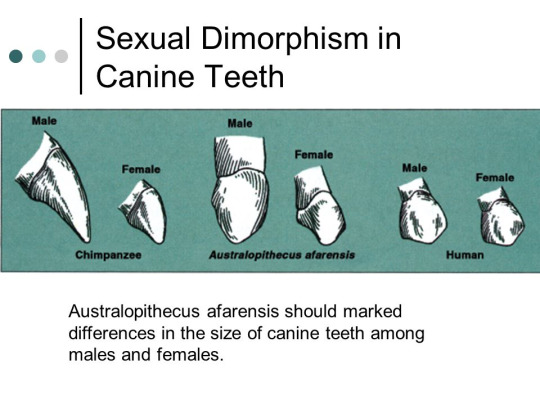
Clearly the men weren’t doing as much fighting. What were they spending their time on? Well, as I pointed out, right at the same time they were losing their fighting adaptations, the children were needing a lot more care.
I think early human men weren’t fighting as much because they were too busy being dads
So my theory is this: protohuman women started having several children a few years apart, who needed more care and supervision for longer. The helpful daughter behavior probably became even more selected for. Soon, any mother who had a son who was also interested in helping with his younger siblings had an advantage in raising successful successors.
And any boy who grew up helping to raise his younger siblings, or being partially raised by an older brother, those boys were going to be more apt and able to help raise their own children later in life, giving that family a real advantage.
At the same time, if most of the men were helping raise children, it would have left previously “male” activities with less individuals to do them. I believe men being active in child rearing combined with natural human social adaptability to solve this, by raising more daughters to fulfill those “male” roles as needed.
Female gorillas cannot fight off leopards and other gorillas nearly as well as male gorillas can, the males are literally 200 pounds heavier and have serious physical adaptations for deadlier biting. Female humans, on the other hand, can pretty much do anything male humans can do, partially due to a lessening of sexual dimorphism.
(Similar forces are at play with meerkats - everybody helps with the kids, everybody fights in territory raids, and as you can see in this picture of two meerkats mating, there is very little difference in physical size or shape)

Basically, I believe that men stepping up to help women is the very thing that enabled us to become human, and that women being perfectly capable of doing whatever men can do is the human trait that allowed that to work so well.
if men couldn’t fill nurturing parenting and familial roles as needed… and if women couldn’t be anything a man can be… I don’t think humans would have become humans.
Bigger brained children with longer periods of helplessness would have died off and we never would have developed increased intelligence and evermore cooperative and complex social dynamics.
So for a man to be a good father/son/brother/partner/community member… for a man to help do all of the things that women do daily, I think is one of the most truly human things a man can do. And for a woman to decide to do anything a man would do, is again, the epitome of being human. Our ability to easily fill roles other more rigidly gendered primates would struggle to fill is a quintessential aspect of our humanity.
We’ve only come away from that model in the last few thousand years after more than 3 million years of sticking with it,. Men accepting their role as women’s helpers and child care providers is still the best way to bring the species back in order, imo.
THAT’s “just human nature”. THAT’s “just biology” and that’s the theory that sort of presented itself to me in the course of my personal studies.
_______________________________________________________________________
flagged every time I reblog the original (you know, the good one with the notes and tags and stuff)
trying this post again, this way to see if it gets flagged and because I would like to be able to put it back on my timeline whenever I want and for it to be reblog-able, that’s the whole point of this website – and so far I’m not seeing it on the pages of people when my notes tell me they reblog it
1 note
·
View note
Text
The Mythology of Work: Eight Myths that Keep Your Eyes on the Clock and Your Nose to the Grindstone
What if nobody worked? Sweatshops would empty out and assembly lines would grind to a halt, at least the ones producing things no one would make voluntarily. Telemarketing would cease. Despicable individuals who only hold sway over others because of wealth and title would have to learn better social skills. Traffic jams would come to an end; so would oil spills. Paper money and job applications would be used as fire starter as people reverted to barter and sharing. Grass and flowers would grow from the cracks in the sidewalk, eventually making way for fruit trees.
And we would all starve to death. But we’re not exactly subsisting on paperwork and performance evaluations, are we? Most of the things we make and do for money are patently irrelevant to our survival—and to what gives life meaning, besides.
This text is a selection from Work, our 376-page analysis of contemporary capitalism. It is also available as a pamphlet.

That depends on what you mean by “work.” Think about how many people enjoy gardening, fishing, carpentry, cooking, and even computer programming just for their own sake. What if that kind of activity could provide for all our needs?
For hundreds of years, people have claimed that technological progress would soon liberate humanity from the need to work. Today we have capabilities our ancestors couldn’t have imagined, but those predictions still haven’t come true. In the US we actually work longer hours than we did a couple generations ago—the poor in order to survive, the rich in order to compete. Others desperately seek employment, hardly enjoying the comfortable leisure all this progress should provide. Despite the talk of recession and the need for austerity measures, corporations are reporting record earnings, the wealthiest are wealthier than ever, and tremendous quantities of goods are produced just to be thrown away. There’s plenty of wealth, but it’s not being used to liberate humanity.
What kind of system simultaneously produces abundance and prevents us from making the most of it? The defenders of the free market argue that there’s no other option—and so long as our society is organized this way, there isn’t.
Yet once upon a time, before time cards and power lunches, everything got done without work. The natural world that provided for our needs hadn’t yet been carved up and privatized. Knowledge and skills weren’t the exclusive domains of licensed experts, held hostage by expensive institutions; time wasn’t divided into productive work and consumptive leisure. We know this because work was invented only a few thousand years ago, but human beings have been around for hundreds of thousands of years. We’re told that life was “solitary, poor, nasty, brutish, and short” back then—but that narrative comes to us from the ones who stamped out that way of life, not the ones who practiced it.
This isn’t to say we should go back to the way things used to be, or that we could—only that things don’t have to be the way they are right now. If our distant ancestors could see us today, they’d probably be excited about some of our inventions and horrified by others, but they’d surely be shocked by how we apply them. We built this world with our labor, and without certain obstacles we could surely build a better one. That wouldn’t mean abandoning everything we’ve learned. It would just mean abandoning everything we’ve learned doesn’t work.
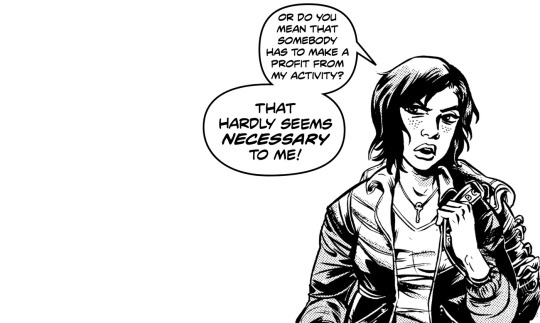

One can hardly deny that work is productive. Just a couple thousand years of it have dramatically transformed the surface of the earth.
But what exactly does it produce? Disposable chopsticks by the billion; laptops and cell phones that are obsolete within a couple years. Miles of waste dumps and tons upon tons of chlorofluorocarbons. Factories that will rust as soon as labor is cheaper elsewhere. Dumpsters full of overstock, while a billion suffer malnutrition; medical treatments only the wealthy can afford; novels and philosophies and art movements most of us just don’t have time for in a society that subordinates desires to profit motives and needs to property rights.
And where do the resources for all this production come from? What happens to the ecosystems and communities that are pillaged and exploited? If work is productive, it’s even more destructive.
Work doesn’t produce goods out of thin air; it’s not a conjuring act. Rather, it takes raw materials from the biosphere—a common treasury shared by all living things—and transforms them into products animated by the logic of market. For those who see the world in terms of balance sheets, this is an improvement, but the rest of us shouldn’t take their word for it.
Capitalists and socialists have always taken it for granted that work produces value. Workers have to consider a different possibility—that working uses up value. That’s why the forests and polar ice caps are being consumed alongside the hours of our lives: the aches in our bodies when we come home from work parallel the damage taking place on a global scale.
What should we be producing, if not all this stuff? Well, how about happiness itself? Can we imagine a society in which the primary goal of our activity was to make the most of life, to explore its mysteries, rather than to amass wealth or outflank competition? We would still make material goods in such a society, of course, but not in order to compete for profit. Festivals, feasts, philosophy, romance, creative pursuits, child-rearing, friendship, adventure—can we picture these as the center of life, rather than packed into our spare time?
Today things are the other way around—our conception of happiness is constructed as a means to stimulate production. Small wonder products are crowding us out of the world.
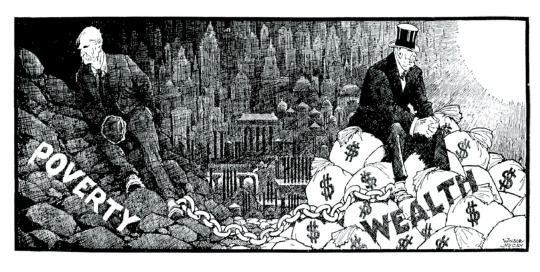

Work doesn’t simply create wealth where there was only poverty before. On the contrary, so long as it enriches some at others’ expense, work creates poverty, too, in direct proportion to profit.
Poverty is not an objective condition, but a relationship produced by unequal distribution of resources. There’s no such thing as poverty in societies in which people share everything. There may be scarcity, but no one is subjected to the indignity of having to go without while others have more than they know what to do with. As profit is accumulated and the minimum threshold of wealth necessary to exert influence in society rises higher and higher, poverty becomes more and more debilitating. It is a form of exile—the cruelest form of exile, for you stay within society while being excluded from it. You can neither participate nor go anywhere else.
Work doesn’t just create poverty alongside wealth—it concentrates wealth in the hands of a few while spreading poverty far and wide. For every Bill Gates, a million people must live below the poverty line; for every Shell Oil, there has to be a Nigeria. The more we work, the more profit is accumulated from our labor, and the poorer we are compared to our exploiters.
So in addition to creating wealth, work makes people poor. This is clear even before we factor in all the other ways work makes us poor: poor in self-determination, poor in free time, poor in health, poor in sense of self beyond our careers and bank accounts, poor in spirit.
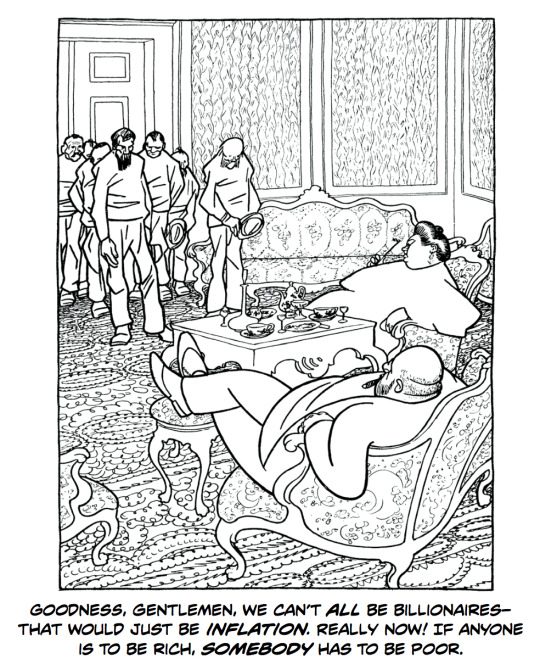
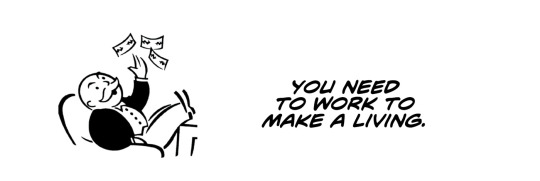
“Cost of living” estimates are misleading—there’s little living going on at all! “Cost of working” is more like it, and it’s not cheap.
Everyone knows what housecleaners and dishwashers pay for being the backbone of our economy. All the scourges of poverty—addiction, broken families, poor health—are par for the course; the ones who survive these and somehow go on showing up on time are working miracles. Think what they could accomplish if they were free to apply that power to something other than earning profits for their employers!
What about their employers, fortunate to be higher on the pyramid? You would think earning a higher salary would mean having more money and thus more freedom, but it’s not that simple. Every job entails hidden costs: just as a dishwasher has to pay bus fare to and from work every day, a corporate lawyer has to be able to fly anywhere at a moment’s notice, to maintain a country club membership for informal business meetings, to own a small mansion in which to entertain dinner guests that double as clients. This is why it’s so difficult for middle-class workers to save up enough money to quit while they’re ahead and get out of the rat race: trying to get ahead in the economy basically means running in place. At best, you might advance to a fancier treadmill, but you’ll have to run faster to stay on it.
And these merely financial costs of working are the least expensive. In one survey, people of all walks of life were asked how much money they would need to live the life they wanted; from pauper to patrician, they all answered approximately double whatever their current income was. So not only is money costly to obtain, but, like any addictive drug, it’s less and less fulfilling! And the further up you get in the hierarchy, the more you have to fight to hold your place. The wealthy executive must abandon his unruly passions and his conscience, must convince himself that he deserves more than the unfortunates whose labor provides for his comfort, must smother his every impulse to question, to share, to imagine himself in others’ shoes; if he doesn’t, sooner or later some more ruthless contender replaces him. Both blue-collar and white-collar workers have to kill themselves to keep the jobs that keep them alive; it’s just a question of physical or spiritual destruction.
Those are the costs we pay individually, but there’s also a global price to pay for all this working. Alongside the environmental costs, there are work-related illnesses, injuries, and deaths: every year we kill people by the thousand to sell hamburgers and health club memberships to the survivors. The US Department of Labor reported that twice as many people suffered fatal work injuries in 2001 as died in the September 11 attacks, and that doesn’t begin to take into account work-related illnesses. Above all, more exorbitant than any other price, there is the cost of never learning how to direct our own lives, never getting the chance to answer or even ask the question of what we would do with our time on this planet if it was up to us. We can never know how much we are giving up by settling for a world in which people are too busy, too poor, or too beaten down to do so.
Why work, if it’s so expensive? Everyone knows the answer—there’s no other way to acquire the resources we need to survive, or for that matter to participate in society at all. All the earlier social forms that made other ways of life possible have been eradicated—they were stamped out by conquistadors, slave traders, and corporations that left neither tribe nor tradition nor ecosystem intact. Contrary to capitalist propaganda, free human beings don’t crowd into factories for a pittance if they have other options, not even in return for name brand shoes and software. In working and shopping and paying bills, each of us helps perpetuate the conditions that necessitate these activities. Capitalism exists because we invest everything in it: all our energy and ingenuity in the marketplace, all our resources at the supermarket and in the stock market, all our attention in the media. To be more precise, capitalism exists because our daily activities are it. But would we continue to reproduce it if we felt we had another choice?
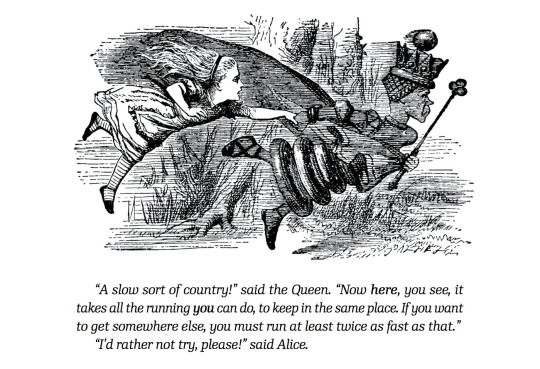
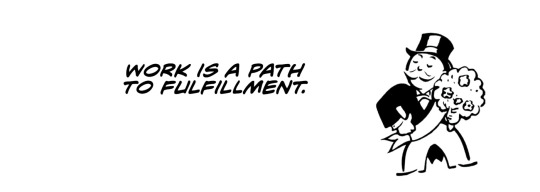
On the contrary, instead of enabling people to achieve happiness, work fosters the worst kind of self-denial.
Obeying teachers, bosses, the demands of the market—not to mention laws, parents’ expectations, religious scriptures, social norms—we’re conditioned from infancy to put our desires on hold. Following orders becomes an unconscious reflex, whether or not they are in our best interest; deferring to experts becomes second nature.
Selling our time rather than doing things for their own sake, we come to evaluate our lives on the basis of how much we can get in exchange for them, not what we get out of them. As freelance slaves hawking our lives hour by hour, we think of ourselves as each having a price; the amount of the price becomes our measure of value. In that sense, we become commodities, just like toothpaste and toilet paper. What once was a human being is now an employee, in the same way that what once was a pig is now a pork chop. Our lives disappear, spent like the money for which we trade them.
Most of us have become so used to giving up things that are precious to us that sacrifice has become our only way of expressing that we care about something. We martyr ourselves for ideas, causes, love of one another, even when these are supposed to help us find happiness.
There are families, for example, in which people show affection by competing to be the one who gives up the most for the others. Gratification isn’t just delayed, it’s passed on from one generation to the next. The responsibility of finally enjoying all the happiness presumably saved up over years of thankless toil is deferred to the children; yet when they come of age, if they are to be seen as responsible adults, they too must begin working their fingers to the bone.
But the buck has to stop somewhere.
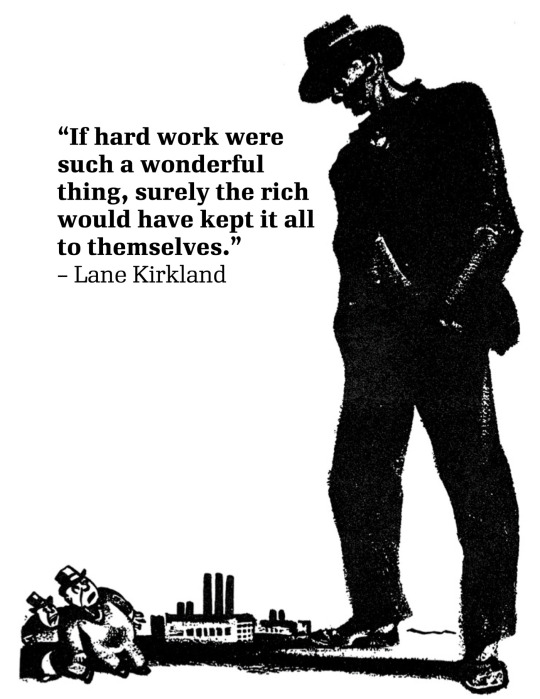

People work hard nowadays, that’s for sure. Tying access to resources to market performance has caused unprecedented production and technological progress. Indeed, the market has monopolized access to our own creative capacities to such an extent that many people work not only to survive but also to have something to do. But what kind of initiative does this instill?
Let’s go back to global warming, one of the most serious crises facing the planet. After decades of denial, politicians and businessmen have finally swung into action to do something about it. And what are they doing? Casting about for ways to cash in! Carbon credits, “clean” coal, “green” investment firms—who believes that these are the most effective way to curb the production of greenhouse gases? It’s ironic that a catastrophe caused by capitalist consumerism can be used to spur more consumption, but it reveals a lot about the kind of initiative work instills. What kind of person, confronted with the task of preventing the end of life on earth, responds, “Sure, but what’s in it for me?”
If everything in our society has to be driven by a profit motive to succeed, that might not be initiative after all, but something else. Really taking initiative, initiating new values and new modes of behavior—this is as unthinkable to the enterprising businessman as it is to his most listless employee. What if working—that is, leasing your creative powers to others, whether managers or customers—actually erodes initiative?
The evidence for this extends beyond the workplace. How many people who never miss a day of work can’t show up on time for band practice? We can’t keep up with the reading for our book clubs even when we can finish papers for school on time; the things we really want to do with our lives end up at the bottom of the to-do list. The ability to follow through on commitments becomes something outside ourselves, associated with external rewards or punishments.
Imagine a world in which everything people do, they do because they want to, because they are personally invested in bringing it about. For any boss who has struggled to motivate indifferent employees, the idea of working with people who are equally invested in the same projects sounds utopian. But this isn’t proof that nothing would get done without bosses and salaries—it just shows how work saps us of initiative.

Let’s say your job never injures, poisons, or sickens you. Let’s also take it for granted that the economy doesn’t crash and take your job and savings with it, and that no one who got a worse deal than you manages to hurt or rob you. You still can’t be sure you won’t be downsized. Nowadays nobody works for the same employer his whole life; you work somewhere a few years until they let you go for someone younger and cheaper or outsource your job overseas. You can break your back to prove you’re the best in your field and still end up hung out to dry.
You have to count on your employers to make shrewd decisions so they can write your paycheck—they can’t just fritter money away or they won’t have it to pay you. But you never know when that shrewdness will turn against you: the ones you depend on for your livelihood didn’t get where they are by being sentimental. If you’re self-employed, you probably know how fickle the market can be, too.
What could provide real security? Perhaps being part of a long-term community in which people looked out for each other, a community based on mutual assistance rather than financial incentives. And what is one of the chief obstacles to building that kind of community today? Work.

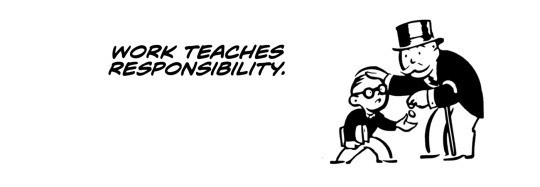
Who carried out most of the injustices in history? Employees. This is not necessarily to say they are responsible for them—as they would be the first to tell you!
Does receiving a wage absolve you of responsibility for your actions? Working seems to foster the impression that it does. The Nuremburg defense—“I was just following orders”—has been the anthem and alibi of millions of employees. This willingness to check one’s conscience at the workplace door—to be, in fact, a mercenary—lies at the root of many of the troubles plaguing our species.
People have done horrible things without orders, too—but not nearly so many horrible things. You can reason with a person who is acting for herself; she acknowledges that she is accountable for her decisions. Employees, on the other hand, can do unimaginably dumb and destructive things while refusing to think about the consequences.
The real problem, of course, isn’t employees refusing to take responsibility for their actions—it’s the economic system that makes taking responsibility so prohibitively expensive.
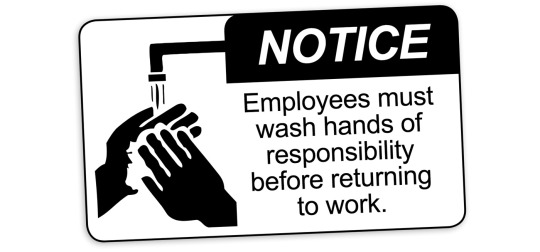
Employees dump toxic waste into rivers and oceans.
Employees slaughter cows and perform experiments on monkeys.
Employees throw away truckloads of food.
Employees are destroying the ozone layer.
They watch your every move through security cameras.
They evict you when you don’t pay your rent.
They imprison you when you don’t pay your taxes.
They humiliate you when you don’t do your homework or show up to work on time.
They enter information about your private life into credit reports and FBI files.
They give you speeding tickets and tow your car.
They administer standardized exams, juvenile detention centers, and lethal injections.
The soldiers who herded people into gas chambers were employees,
Just like the soldiers occupying Iraq and Afghanistan,
Just like the suicide bombers who target them—they are employees of God, hoping to be paid in paradise.
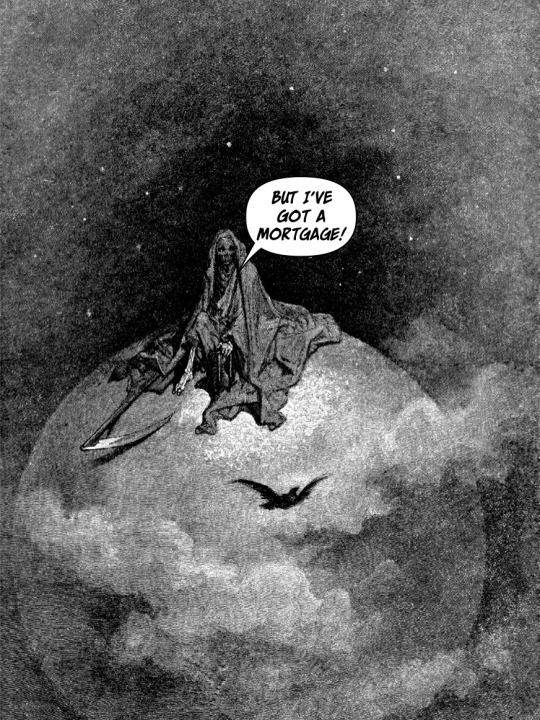

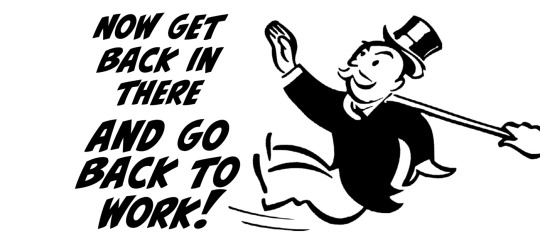
Let’s be clear about this—critiquing work doesn’t mean rejecting labor, effort, ambition, or commitment. It doesn’t mean demanding that everything be fun or easy. Fighting against the forces that compel us to work is hard work. Laziness is not the alternative to work, though it might be a byproduct of it.
The bottom line is simple: all of us deserve to make the most of our potential as we see fit, to be the masters of our own destinies. Being forced to sell these things away to survive is tragic and humiliating. We don’t have to live like this.
219 notes
·
View notes
Link
Asking women to wait to have kids until they have launched a career and saved up enough money is just the obverse of commanding women to stay at home and make babies for their husbands. Both ask women to defer not to their desires, but to an all-powerful abstraction: the market, the environment, patriarchy, or even a twisted faux feminism.
It’s important for those of us in the professional classes to remember that, for the vast majority of working people, the labor market is not a potential site of self-realization and never will be. Instead, it’s a brutal arena where you’re forced to trade a third of your life in order to survive. In 2018, a “do what you love” career is far out of reach for all but the affluent. What the professional classes will never understand — both conservatives who shame young single mothers or liberals who demand that women defer parenthood until they can afford Baby Bjorn — is just how rewarding child-rearing is for those who are under no delusions that capitalism will ever provide validation.
How can we ever win a program that socializes the costs of bringing children into the world if so many liberals still see the desire to have kids as something like a timeshare in Vegas — a costly, foolish, and tacky investment mostly for the rubes? Instead of parroting this gross and misanthropic politics, we should demand that capital stop shirking off the costs of childhood onto workers and instead socialize them — free Finnish baby boxes and a Medicare for All program that covers not only all prenatal and pediatric care, but that makes IVF a right and not a luxury. A program that hires and trains hundreds of thousands to work in high-quality state day cares. The only way we’re going to get any of this is through a revived labor movement — not creepy (and inevitably racist) “population control” thinkpieces.
YES YES YES all of this.
29 notes
·
View notes
Text
Inequality is not humanity's natural state
SOURCE How the Agricultural Revolution made us inequal
The !Kung people of the Kalahari Desert...demonstrate a sexual egalitarianism...
SEXUAL AND SOCIAL EQUALITY
While men tend to hunt and women tend to gather, these roles often overlap. Women retain control over the food they gather. Both men and women raise children equally. Studies on other contemporary hunter-gatherer societies show a similar degree of sexual equality.
Among the Hadza of Tanzania, the !Kung, and other nomadic hunter-gatherer tribes, resources are shared equally.
THE CONCEPT OF OWNERSHIP
...when it exists, generally takes the form of being associated with a place or thing rather than possessing it. Hunted or gathered food is shared equally among all members of the tribe. Sometimes, a chief or elder individual will be responsible for divvying out the food, but this authority figure receives as much as the other tribe members. Generally, individuals who attempt to assert dominance or establish a leadership position are ridiculed and ostracized.
FOOD SURPLUS CULTURE BEGETS CONTROL = INEQUALITY
These egalitarian qualities were not present in early agricultural societies. The big advantage of agriculture over hunting and gathering is that it enables the production of food surpluses.
But agriculture is fickle. When the weather is unfavorable, or plants become diseased, hunter-gatherers shift to another food source. This can't be done in agricultural societies, which rely on a small selection of crops produced on large scales. For a relatively recent example, consider the Irish Potato Famine.
Not only are food surpluses necessary for agricultural societies to survive, they also become highly desirable to control. In fact, recent research shows that ancient societies that had greater food surpluses tended to have higher levels of inequality.
...AS WELL AS SEXUAL INEQUALITY
Labor roles became more gendered as well.
Generally, men did the majority of the fieldwork while women were relegated to child-rearing and household work. Without contributing food (and by association, without control over it), women became second-class citizens. Women also had babies more frequently, on average once every two years rather than once every four in hunter-gatherer societies.
CONTROL REQUIRES A SUPPORT HIERARCHY
Because somebody had to have control over surplus food, it became necessary to divide society into roles that supported this hierarchy.
The roles of an administrator, a servant, a priest, and a soldier were invented. The soldier was especially important because agriculture was so unsustainable compared to hunting and gathering.
HIGH FAILURE POINTS LEAD TO ENCROACHMENT AND MALTREATMENT
The fickleness of agriculture ironically encouraged more migration into neighboring lands in search of more resources and warfare with neighboring groups.
Capturing slaves was also important since farming was hard work, and more people were working in these new roles.
RELATED ARTICLES
Agriculture was bad for health
Authoritarianism was a very imperfect solution for the disconnection between the social network and the social organism...
...that arose with the birth of agriculture and a need for methods for human organization which had not been needed as hunter-gatherers.
Democracy (and the many forms of scaled representation whether via election, sortition or other method) arose as a response to authoritarianism and its unsuitability to human creativity and development… i.e. its inevitable failure.
Oligarchies are over time an unfortunately inevitable problem when society scales beyond natural human community size.
The most immediate response to this dilemma [the birth of agriculture] was authoritarian forms of governance with all the fixings… military classes, worker classes, slavery and oligarchy. A perfectly natural outcome. Specialized networks, forming networks of networks were required for such a complex social organism to function.
What may have begun as needed specialization by an even accidental decision-making group, with even the best of intentions (e.g. Plato’s philosopher kings), will tend to become self-reinforcing and isolated with it’s own internal loyalties and identifications related to the natural drives linked to their own personal associations
Designs for Representative Government have all been attempts to broaden the decision system beyond the closed networks that tend to form if not interrupted. They do this generally by introducing systems of rules and horizontal or distributed networks to counter-balance or interrupt hierarchical networks; e.g. Constitutions, Bills of Rights, Legislatures, Suffrage, etc.
The Chagora Hypothesis
Social Organisms inevitably tend towards Authoritarianism over time due to inherent characteristics which arise when scaled beyond Dunbar’s Number.
Further, as complex/chaotic systems, social organisms are inherently unstable.
Representative Systems arose as a response to repeated “Ultimatum Game” related disasters inevitably befalling Authoritarian Regimes.
Representative Systems are also inherently unstable.
The mechanisms of Representative Systems are NEVER finished and must constantly be addressed to maintain a healthy state of system criticality and hence, survival.
CHAGORA
The way back for Representative Government is to revitalize the citizen's power and the role of citizenship.
Make citizenship count for something other than consumerism. Give the citizen a bit of responsibility for his own governance.
Civilization Systems
1 note
·
View note